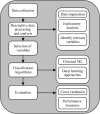Smartphones dependency risk analysis using machine-learning predictive models
- PMID: 36587033
- PMCID: PMC9805435
- DOI: 10.1038/s41598-022-26336-2
Smartphones dependency risk analysis using machine-learning predictive models
Abstract
Recent technological advances have changed how people interact, run businesses, learn, and use their free time. The advantages and facilities provided by electronic devices have played a major role. On the other hand, extensive use of such technology also has adverse effects on several aspects of human life (e.g., the development of societal sedentary lifestyles and new addictions). Smartphone dependency is new addiction that primarily affects the young population. The consequences may negatively impact mental and physical health (e.g., lack of attention or local pain). Health professionals rely on self-reported subjective information to assess the dependency level, requiring specialists' opinions to diagnose such a dependency. This study proposes a data-driven prediction model for smartphone dependency based on machine learning techniques using an analytical retrospective case-control approach. Different classification methods were applied, including classical and modern machine learning models. Students from a private university in Cali-Colombia (n = 1228) were tested for (i) smartphone dependency, (ii) musculoskeletal symptoms, and (iii) the Risk Factors Questionnaire. Random forest, logistic regression, and support vector machine-based classifiers exhibited the highest prediction accuracy, 76-77%, for smartphone dependency, estimated through the stratified-k-fold cross-validation technique. Results showed that self-reported information provides insight into predicting smartphone dependency correctly. Such an approach opens doors for future research aiming to include objective measures to increase accuracy and help to reduce the negative consequences of this new addiction form.
© 2022. The Author(s).
Conflict of interest statement
The authors declare no competing interests.
Figures
Similar articles
-
Explainable prediction of problematic smartphone use among South Korea's children and adolescents using a Machine learning approach.Int J Med Inform. 2024 Jun;186:105441. doi: 10.1016/j.ijmedinf.2024.105441. Epub 2024 Mar 30. Int J Med Inform. 2024. PMID: 38564961
-
Can Predictive Modeling Tools Identify Patients at High Risk of Prolonged Opioid Use After ACL Reconstruction?Clin Orthop Relat Res. 2020 Jul;478(7):0-1618. doi: 10.1097/CORR.0000000000001251. Clin Orthop Relat Res. 2020. PMID: 32282466 Free PMC article.
-
Testing Suicide Risk Prediction Algorithms Using Phone Measurements With Patients in Acute Mental Health Settings: Feasibility Study.JMIR Mhealth Uhealth. 2020 Jun 26;8(6):e15901. doi: 10.2196/15901. JMIR Mhealth Uhealth. 2020. PMID: 32442152 Free PMC article.
-
Systematic Review of Digital Phenotyping and Machine Learning in Psychosis Spectrum Illnesses.Harv Rev Psychiatry. 2020 Sep/Oct;28(5):296-304. doi: 10.1097/HRP.0000000000000268. Harv Rev Psychiatry. 2020. PMID: 32796192
-
The negative impact of smartphone usage on nursing students: An integrative literature review.Nurse Educ Today. 2021 Jul;102:104909. doi: 10.1016/j.nedt.2021.104909. Epub 2021 Apr 17. Nurse Educ Today. 2021. PMID: 33894590 Review.
Cited by
-
The Relationship Between Smartphone and Game Addiction, Leisure Time Management, and the Enjoyment of Physical Activity: A Comparison of Regression Analysis and Machine Learning Models.Healthcare (Basel). 2025 Jul 25;13(15):1805. doi: 10.3390/healthcare13151805. Healthcare (Basel). 2025. PMID: 40805838 Free PMC article.
References
-
- Demir K, Akpinat E. The effect of mobile learning applications on students’ academic achievement and attitudes toward mobile learning. Malays. Online J. Educ. Technol. 2018;6:48–59. doi: 10.17220/mojet.2018.02.004. - DOI
-
- Abadiyan F, Hadadnezhad M, Khosrokiani Z, Letafatkar A, Akhshik H. Adding a smartphone app to global postural re-education to improve neck pain, posture, quality of life, and endurance in people with nonspecific neck pain: A randomized controlled trial. Trials. 2021;22:274. doi: 10.1186/s13063-021-05214-8. - DOI - PMC - PubMed
Publication types
MeSH terms
LinkOut - more resources
Full Text Sources




